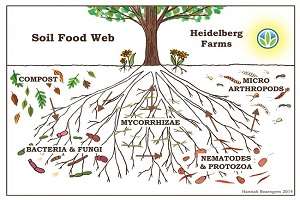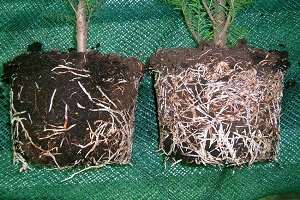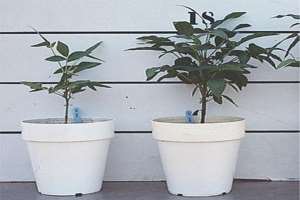By Robert Williams
Often in our gardening endeavors, it is only the plant itself that we know. However, beneath the soil we cultivate is a vast network of other natural helpers, working hard to ensure the right environment for plants to grow.
While earthworms, burrowing bugs and other critters are familiar sights, among the smallest—but very important—organisms are mycorrhizae. Put simply, these are fungi that form close relationships with plant roots.
This association allows for nutrient exchange between the plant and the mycorrhizae, benefiting both. These fungal organisms are small—much smaller than the root systems they associate with. In a way, they are extensions of the root systems, and as they penetrate the small pores in the surrounding soil, they extract key nutrients that the plant might not access otherwise.
As you might imagine, this relationship is critical for plants in nutrient-poor soils. Mycorrhizae have even been known to help bind toxic residues, such as heavy metals, preventing uptake by the host plant. These fungal partners also increase the surface area of a plant's root system, allowing for better nutrient absorption, structural anchoring and overall resilience.
The full range of benefits that mycorrhizae offer is beyond the scope of this article, but a bit of basic science can help you appreciate why they are important.
While some mycorrhizae actually penetrate plant cells and carry out their processes internally, others reside outside the plant cells. Complex chemical cues and interactions attract—or in some cases repel—these fungi and their plant hosts.
Many of these relationships are very specific, requiring a direct match between plant host and fungi. The host provides carbohydrates, and the fungi break down and supply other vital products that the plant can eventually use.
Many of us think about fertilizer or soil amendments when we think about plant health. But the microscopic biological activity of mycorrhizae is critical to the health of our gardens, too.
Consider the mycorrhizae when deciding on treatments for pests or diseases. Toxic chemicals can leach into the soil, adversely affecting beneficial soil microorganisms. Fungicides present special concerns because mycorrhizae are fungi. Do your homework and read any label directions before use.
Also think about the impact of soil disturbance. Tilling soil breaks up those extensive root networks, which take time to get established.
Perennials and shrubs aren't the only plants that benefit from these microorganisms. Many trees form extensive networks with mycorrhizae and share nutrients and nitrogen. Fungi help with soil tilth as well. Their fine structures improve water retention and soil aeration, and they help break down soil minerals due to acids they secrete.
Given the benefits attributed to these organisms, some gardeners consider inoculating their soil with them. While many commercial growers do so, home gardeners typically have enough microorganisms in their soil to do the job.
However, if you have recently planted a bed with sterile soil media—or are just curious to see if your yields increase—you could inquire at local nurseries about a product for your particular needs. Remember that the goal is healthy soil. Mycorrhizae make a contribution, but so will minimizing the use of harmful chemicals, encouraging earthworms and other native soil inhabitants, and practicing good gardening habits such as crop rotation and mulching.
The next time you step into your garden, consider the great events taking place just beneath your feet. Although the produce we harvest is the most tangible part of our efforts, an entire underground universe of mycorrhizal connections and structures makes it possible.
Workshop: U. C. Master Gardeners of Napa County will host a workshop on “Rose Pruning” on Saturday, January 7, from 10 a.m. to noon, at University of California Cooperative Extension, 1710 Soscol Avenue, Napa. Certified Rosarian Lynne Andresen and other Master Gardener rose enthusiasts will demonstrate and explain proper pruning techniques and review rose types, common rose disorders and routine maintenance. Online registration (credit card only); Mail-in registration (check only or drop off cash payment).
Master Gardeners are volunteers who help the University of California reach the gardening public with home gardening information. U. C. Master Gardeners of Napa County ( http://ucanr.edu/ucmgnapa/) are available to answer gardening questions in person or by phone, Monday, Wednesday and Friday, 9 a.m. to Noon, at the U. C. Cooperative Extension office, 1710 Soscol Avenue, Suite 4, Napa, 707-253-4143, or from outside City of Napa toll-free at 877-279-3065. Or e-mail your garden questions by following the guidelines on our web site. Click on Napa, then on Have Garden Questions? Find us on Facebook under UC Master Gardeners of Napa County.


